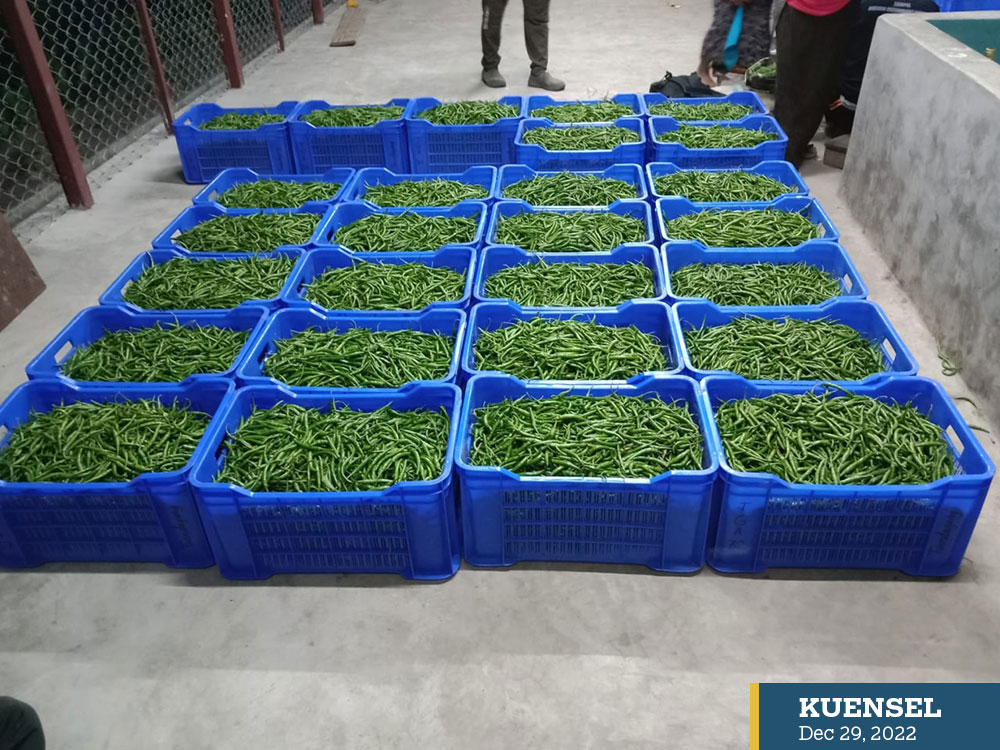… blame poor sales on loose ban on imported chillies and cauliflowers
Choki Wangmo | Tsirang
While illegally imported chillies, cauliflowers, and broccolis are making rounds at the price of local produce, farmers of the southern dzongkhags say their vegetables are rotting in the fields.
A few years ago, there was a surge in commercial farmers growing winter vegetables under the economic contingency plan triggered by the pandemic and import restrictions on chillies, beans, and cauliflowers.
Today, these farmers are suffering losses due to a lack of market for their local produce. Many have given up their farms due to stiff competition from illegally imported vegetables sold at a cheaper rate.
Hochu Leki is Dagana dzongkhag’s commercial vegetable aggregator (CA). He has signed contracts with farmers to market their vegetables to other dzongkhags.
Since the harvest season of winter chillies and cauliflowers started a month ago, he has been constantly receiving calls from farmers across the gewogs. Everyone wanted him to collect their chillies and cauliflowers. The pressure is only expected to mount as many of his CA friends left the vegetable business for other opportunities.
“I cannot deny requests from farmers as I am bound to them with contract agreements,” Hochu Leki said.
He had marketed chillies and cauliflowers from Dagana to other dzongkhags but without success. It took him six days to sell 600kgs of local chillies at Thimphu Centenary Farmers’ Market (CFM).
He has collected three Bolero loads of chillies from across the dzongkhag. He buys a kg of chilli at a farmgate price of Nu 100 and has to sell at Nu 70 or 80 at the CFM. “Vendors at CFM say that they can easily buy imported chillies at Nu 15 and sell at Nu 45. They refuse the locally sourced ones,” he said.
Some vendors, he said, directly contact farmers and buy chillies at an increased rate to charge high prices at the CFM. This trend, he said, is eventually affecting the farmers as consumers complain about high charges for local produce.
The highest price a CA can charge a farmer is Nu 350 a kg according to the fixed farmgate price for chillies.
The dzongkhag has a designated counter at the CFM, but farmers say that it was impossible to compete with imported produce.
Commercial farmers said that if the government could at least strictly monitor illegal imports or impose import restrictions for vegetables in two months in winter, it would greatly enhance marketing and encourage farmers to continue commercial production.
“Marketing is a challenge every winter. We can’t totally ban import but there needs to be strict monitoring by the authorities concerned,” said Bimal Subba a progressive youth farmer in Samarchu.
He said that it was time the government trusted local producers and let them pick up their businesses until the country is self-sufficient. “Farmers are discouraged and leave commercial production as there is a continued disruption in the market.”
In the past, Bimal Subba and his brothers earned Nu 800,000 from the sale of chillies. They have expanded the farm to seven acres this year.
They have harvested about 980kgs within a month. The production is expected to increase in February.
“Restriction is the way forward; we can never compete with imported products. But the country is prioritising organic produce and we can be chilli sufficient in two to three years” the youth said.
Dhan Bdr Subba’s 30 decimal chilli farm is still not harvested. No CAs contacted him this year. Most of the villagers in Samarchu could improve their livelihood from the sale of chillies.
“In the first year of cultivation, it took time for us to get used to the equipment and new methods of farming. Now, we are confident and there is no market,” said Dhan Kumar Subba.
Farmers are also struggling to market cauliflowers due to surplus production in the country.
Hochu Leki said that they can’t even market a kg of cauliflower at Nu 15 at CFM. Last year, he earned Nu 60 a kg.
“The situation has deteriorated and people are no longer interested. We talk about self-sufficiency and then allow import, discouraging local producers,” he added.
Karmaling Kuenphen Tshogpa wrote to the gewog administration recently seeking support and interventions for chilli marketing. The CAs and farmers also approached the dzongkhag administration. There is no official communication yet.
In Tsirang, many farmers abandoned winter chilli cultivation. They are now growing early chillies (big chillies). The farmers, however, are struggling to sell cauliflowers and broccolis.
“Most of the broccolis are flowering in the fields,” said an agriculture extension officer in one of the gewogs.
A farmer from Sergithang, San Man Subba, said that the farmers are now selling a kg of cauliflower at Nu 20 to 30. “Rampant illegal import is wiping off the market for local producers,” he said.
He said that not many are interested in farming now.
Agriculture Minister Yeshey Penjor said that the import restriction on chillies, beans, and cauliflower is still effective. “Illegal importers of these banned produce are liable for hefty fines and penalties.”
Farmers should inform their local government leaders for effective response, Lyonpo added.
In 2016, the government imposed import restrictions on chillies, cauliflowers, and beans, stating high pesticide content.
However, farmers allege that there is no strict monitoring at the borders.


